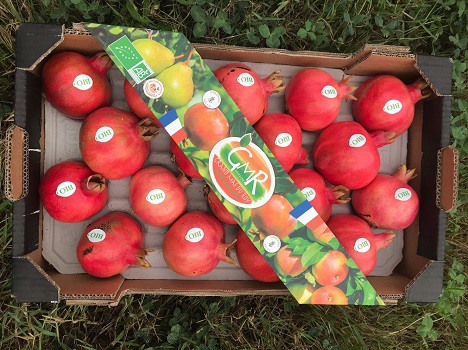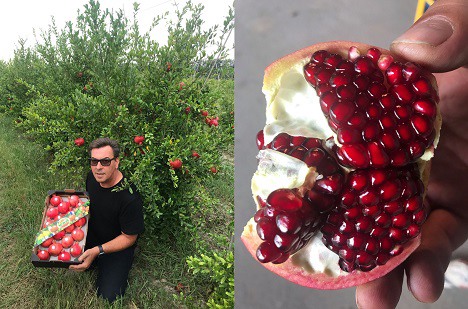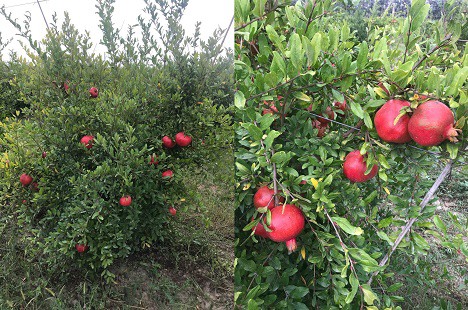The season of the organic pomegranates is starting for Grand Mas du Roy, a producer from Arles specialized in organic agriculture. “This year is our first production of pomegranates. The first orchards were planted in 2018/19 with the varieties Acco, Wonderful and Mollar d’Elche. This year, the red Rugalate variety is joining our selection,” explains Frédéric Chabert.
With 5 hectares, including 1 in full production, and a density of 1,250 trees/ha on average, Grand Mas du Roy is expecting a harvest of 6-7 tons this year. The picking started on September 10th and the fruit will be on the market this week. “The harvest should end in late October, but the pomegranate is a fruit that keeps rather well when refrigerated.”
 © Grand Mas du Roy
© Grand Mas du Roy
“Our goal is to sell the varieties with their typical colors, not just to market the product simply as pomegranates. Therefore, we want to segment the commercial part well in order to sell a maximum of fruit for direct consumption.” Frédéric Chabert explains that in order to value the entire production, the products left unsold are processed into juice.
Collaboration with GRCETA of Low Durance
Pomegranate cultivation in France is still in its infancy, but Grand Mas du Roy is monitored technically by GRCETA of Low Durance (Research Group on Crops and Agricultural Techniques), a technical center recognized in all production basins for its advice on apples, pears and peaches. “For some time now, the new arboricultural advisor to have integrated the team, Sophie Hardy, has been helping producers diversify their structure. We work in close collaboration on the technical aspect of pomegranates. Our orchard is planted in a flat shape to get more sunlight, obtain bigger sizes and nice colors. Other orchards are planted in free form and tatura. These tests are monitored by GRCETA of Low Durance. We have also carried out thinning trials which turned out to be a success. Another important technical aspect studied by GRCETA concerns fertilization in order to be able to identify which flowers will give fruit.”
 On the left: Frédéric Chabert/© Grand Mas du Roy
On the left: Frédéric Chabert/© Grand Mas du Roy
A promising season for a demanding market
Thanks to its reputation as a superfood, pomegranate consumption has nearly tripled in 10 years. “The market seems interesting, consumers are asking for the product and the trend of consuming local and French products reinforces this already present demand.”
With a Brix level of 13° and very regular and homogeneous fruit, the season looks promising. “We’ve been lucky here to be able to find the right stage of harvest, when the fruit has reached maximum ripeness before bursting. We rely on the color and shape of the pomegranate to see when the ‘muscles’, those blisters on the fruit, will appear. They are a sign that the fruit is ready to be picked.”

About the orchards of Grand Mas du Roy
The family business was created in 1978 and is managed today by Frédéric Chabert. Among its own production, Grand Mas du Roy offers apples, pears, pomegranates, olives and soon peaches, nectarines and aromatic herbs. The products are marketed via shippers, wholesalers and specialized stores.
For more information:
Frédéric Chabert
Grand Mas du Roy
Phone: 04 90 96 53 79
frederic.masduroy@gmail.com
